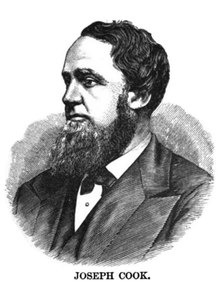Josephus Flavius Cook

Josephus Flavius Cook (1838–1901), commonly known as Joseph Cook, was an American philosophical lecturer, clergyman, and writer. A descendant of Pilgrims, Cook started his ascent to fame by way of Monday noon prayer meetings in Tremont Temple in Boston that for more than twenty years were among the city's greatest attractions. In the lectures, Cook attempted to convey recent developments in European science and philosophy in a way that reconciled them to Protestant belief; his commentary stressed social amelioration and civic responsibility. He later travelled the world; his lectures were published and translated into several languages.
Cook was noted for his adversity to Christian Science, which drew a response from Mary Baker Eddy, who wrote a pamphlet, later expanded into the book No and Yes which opposed Cook's views on the subject. Eddy also spoke at one of Cook's Tremont Temple lectures in defence of Christian Science.[1]
Born in Ticonderoga, New York, he attended Phillips Academy, and then entered Yale College, later transferring to Harvard College, from which he graduated in 1865.[2]
Bibliography
- Cook, Joseph (1879). Transcendentalism, with Preludes on Current Events. London: Dickinson.
- Guelzo, Allen C. (2004). "Joseph Cook." American National Biography. Retrieved September 17, 2007.
See also
References
- ↑ https://www.marybakereddylibrary.org/research/historical-background-no-and-yes/
- ↑ L.T. Remplap, ed., The Gospel Awakening (1885), p. 44.